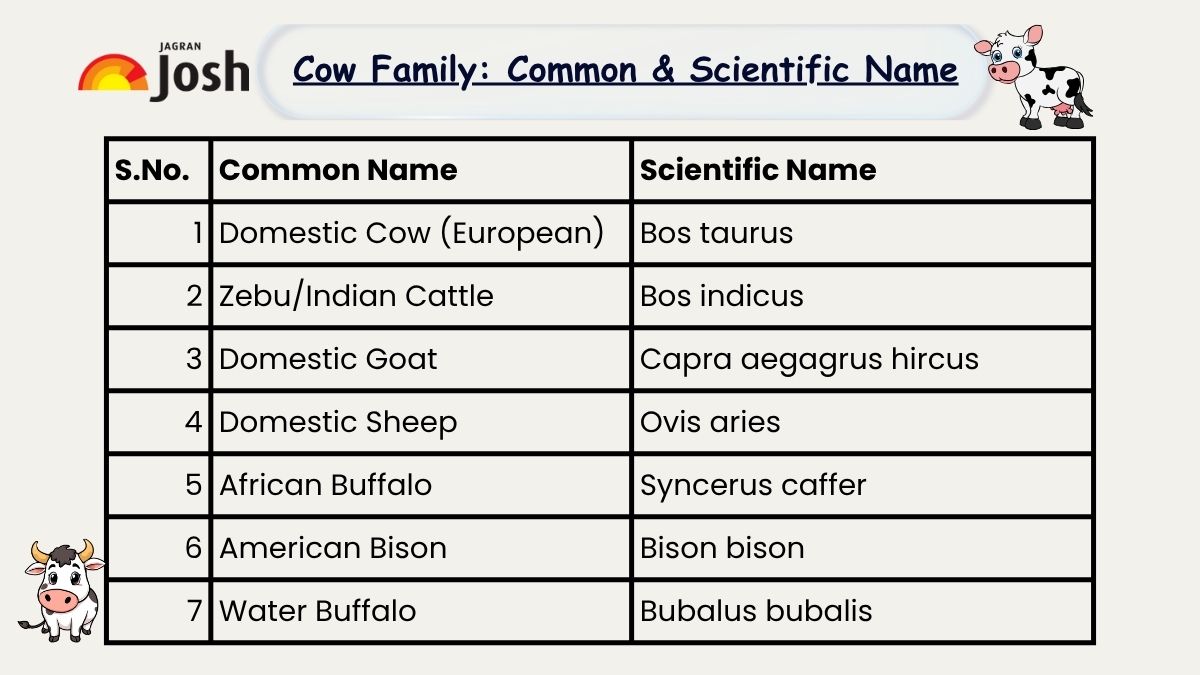Key Points
- The cow's scientific name is Bos taurus or Bos indicus (Zebu).
- Cows belong to the Bovidae family, including sheep, goats, and bison.
- Cows are social, intelligent animals with near 360° vision.
When searching for the scientific name of a cow, you will primarily find Bos taurus. This is the classification for the most common European or "taurine" cattle. However, the humped cattle, or Zebu, that are widespread across Asia, particularly in India, are often designated as Bos indicus. Both fall under the genus Bos and descend from the extinct wild ox, the aurochs.
The cow plays an immensely critical role in agriculture worldwide. In India, in particular, the livestock sector is crucial, contributing significantly to the economy. Reports say that the country's huge cattle herd, which had about 307.4 million cows and buffalo in 2024, shows how important these animals are still.
Family of Cow and its Scientific Name
The cow is a key member of the family Bovidae. This family is expansive and diverse, comprising all cloven-hoofed, ruminant mammals. Bovidae is one of the biggest families in the order Artiodactyla, which includes even-toed ungulates. There are about 143 species of Bovidae.
Most Bovidae animals have permanent, unbranched horns and a special four-compartment stomach that lets them digest plant matter by regurgitating and re-chewing cud. The family includes some of the most recognizable animals on Earth:

| Common Name of Cow | Cow Scientific Name | Commonly Found In |
| Domestic Cow (European) | Bos taurus | Europe, the Americas, Australia, and regions with cooler climates. |
| Zebu/Indian Cattle | Bos indicus | Indian Subcontinent, Southeast Asia, Africa, and tropical regions. |
| Domestic Goat | Capra aegagrus hircus | Worldwide (domesticated); Ancestor is native to Southwest Asia and Eastern Europe. |
| Domestic Sheep | Ovis aries | Worldwide (domesticated); Ancestor is native to the Middle East and Central Asia. |
| African Buffalo | Syncerus caffer | Sub-Saharan Africa (various habitats like savanna and rainforest). |
| American Bison | Bison bison | North America (primarily grasslands and prairies in conservation herds). |
| Water Buffalo | Bubalus bubalis | Indian Subcontinent, Southeast Asia, Southern Europe (Italy, Balkans), and Australia. |
Find Out - What is the Scientific Name for a Banana?
5 Scientific Facts about Cows
Here are some of the most interesting facts about cows you may not know yet:
1. Near 360-Degree Vision
Cows have eyes on the sides of their heads, which gives them an almost 360-degree view of the world. This wide field of vision is a biological adaptation that helps them keep an eye on their surroundings for danger while they eat.
2. Methane and Climate Impact
Their special way of digesting food, called enteric fermentation, makes a lot of methane gas, which is a very strong greenhouse gas. This gas mostly comes out when a cow burps, and one cow can make up to 500 liters of it every day.
3. Complex Social Bonds
Research has shown time and time again that cows are smart and emotional animals that make strong, lasting friendships. When a cow is separated from its favorite "best friend," its heart rate and cortisol levels rise a lot, which means it is stressed.
4. Excellent Olfaction (Sense of Smell)
Cows have a very good sense of smell; they can smell things from up to 10 kilometers away. This skill is very important for finding food, water, and noticing changes in their surroundings.
5. Long-Term Memory
These animals have great long-term and spatial memory. They can remember where to find good places to eat and drink, and they can also remember and recognize people's faces. This shows that they can learn and tell people apart.
Do You Know - What is the Scientific Name of Eggplant?
The cow, scientifically known as Bos taurus or Bos indicus, is an interesting animal that belongs to the diverse Bovidae family. This taxonomic detail shows how it is related to other animals with split hooves. People also value cows highly because they are smart and play an important role in the economy.
Comments
All Comments (0)
Join the conversation